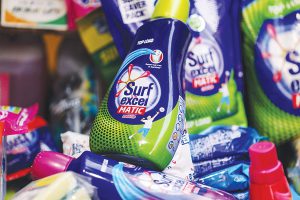Bloomberg
Unilever Plc’s Indian unit reported a better-than-expected quarterly profit as the declining prices of key raw materials, including palm oil, boosted the consumer goods giant. It also raised the royalty payout to its European parent.
Mumbai-based Hindustan Unilever Ltd. posted a net income of 25.1 billion rupees ($309 million) for the quarter ended December 31, according to an exchange filing on Thursday. That beat the average profit forecast of 24.86 billion rupees by analysts in a Bloomberg survey.
Revenue matched estimates at 149.9 billion rupees, while total costs climbed 19% to 119.8 billion rupees compared to the year-ago period. Volume growth for the quarter was 5%.
Unilever also asked for a review from the Indian unit after which the royalty payout will increase to 3.45% from 2.65% over three years.
The robust earnings come on the back of lower edible and crude oil costs as well as the gradual easing of entrenched inflationary pressures, which last year forced Indian consumer staple companies to hike prices and shrink pack sizes to protect their margins. India’s retail inflation dipped for a third straight month in December, helped by a fall in food prices.
Many in the sector are also “taking price cuts mainly to perk up volumes specifically in rural regions,†Manyal said, adding Hindustan Unilever reduced the prices of soaps and detergents by 5%-10% in October.
The maker of Dove soaps and Magnum ice-cream is attempting to protect its dominant market share in the country of 1.4 billion people. Inflation is still pinching demand in India’s vast countryside, where 70% of the population lives, and competition is expected to intensify.
Inflationary pressures continued to weigh on rural buyers in the December quarter, with many downtrading to smaller packs and brands.
 The Gulf Time Newspaper One of the finest business newspapers in the UAE brought to you by our professional writers and editors.
The Gulf Time Newspaper One of the finest business newspapers in the UAE brought to you by our professional writers and editors.
